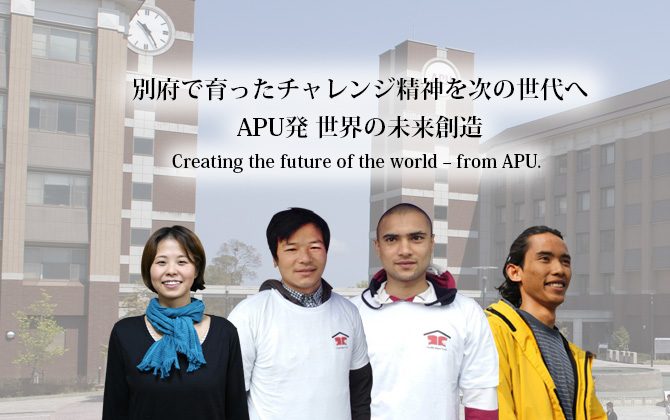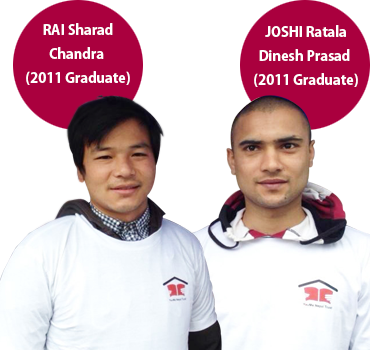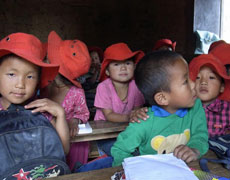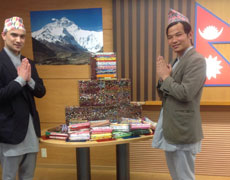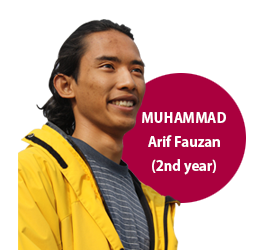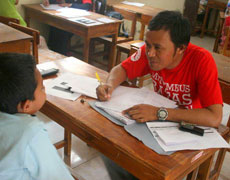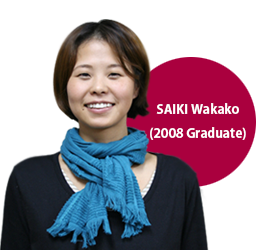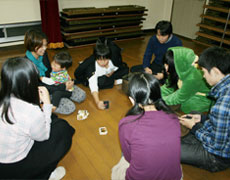After enrolling at APU in 2007, RAI Sharad Chandra and JOSHI Ratala Dinesh Prasad spent four years studying in the College of Asia Pacific Studies (APS) before graduating and setting up the YouMe Nepal Trust non-profit organization. Although they are based in Japan, their activities include building schools in Nepal.
Born in a poor village in eastern Nepal, RAI studied diligently and received scholarships to study at elite private elementary, junior high and high schools in Nepal. In his final year at high school, he was invited to visit Japan by the Japanese Ministry of Education, Culture, Sports, Science and Technology. His interest in Japan grew and he decided to further his studies by entering a Japanese university. He chose APU for the opportunity it gave him to study in English.
JOSHI, who was born in a poor farming village in western Nepal, has been friends with RAI since their elementary school days, and followed in his footsteps by also coming to APU one semester after RAI enrolled.
Both men worked as volunteers during their time at APU, visiting local primary schools in the cities of Beppu and Oita to carry out international exchange activities with the children. RAI, who lived in Beppu's Kamegawa area and worked part-time at local shops and tourist spots, says, "The people of Beppu were so friendly and welcoming to me. I know everything about Beppu now. It is like my hometown in Japan." RAI also published a bilingual campus newspaper that introduced various events on campus and happenings around the world in both Japanese and English.
"I made friends with people from many different countries at APU. The multicultural environment really appealed to me, and APU gave me the skills to instantly become friends with people from all walks of life," says RAI.
Six months before graduation, the two men discussing possibilities for their future when they heard that all of the children from RAI's village in Nepal had failed to get into junior high school. "At that time, we were thinking that we would like to be able to do something for Nepal, the country that raised us, so hearing this news made us think about building schools to provide children with a better quality of education," said RAI, reflecting on that point in time.
After graduating from APU, JOSHI went to graduate school at the United Nations University, while RAI spent some time learning about the Japanese education system as an elementary and junior high school English teacher in Fukuoka prefecture, before heading to graduate school at the University of Tokyo. In 2012, when they were both still studying at graduate school, RAI and JOSHI founded their NPO and established a YouMe School in RAI's home village. 'YouMe' incorporates both the Japanese word for dream 'yume' and the English words 'you & me'.
Classes at YouMe Schools are taught entirely in English by highly-skilled teachers. Tuition fees are the equivalent to roughly 500 yen per month, a significant amount for families in Nepalese farming villages where the average wage is only 3,000 yen per month. However, RAI and JOSHI have created a scholarship system for those families that can't afford the fees whereby children from these families help with various chores around the school in exchange for tuition. There are currently about 100 children between the ages of six and 12 going to this school, and last December the non-profit organization completed construction on a stone school house.
After completing his master's program at the University of Tokyo, RAI began working at an IT company in Tokyo last October. In the future, he hopes to incorporate IT, with its global scope, into education and use the internet to provide an even higher quality education.
"At some point, I hope we can build schools all over Nepal. What it comes down to is that we just need more schools, but first we need to succeed with our own projects, so that we can show the children of Nepal what is possible. It would be great if we could find others to follow and help us on our journey," says RAI.
Together, these APU graduates hold the key to cultivating the next generation of Nepalese citizens.


